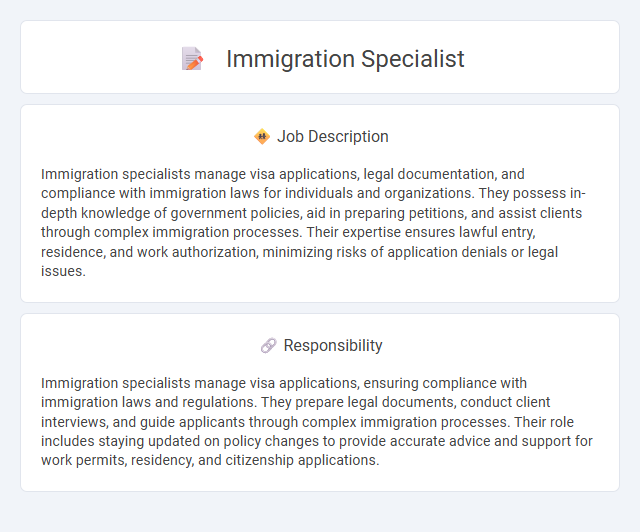
Immigration specialists manage visa applications, legal documentation, and compliance with immigration laws for individuals and organizations. They possess in-depth knowledge of government policies, aid in preparing petitions, and assist clients through complex immigration processes. Their expertise ensures lawful entry, residence, and work authorization, minimizing risks of application denials or legal issues.
Individuals with strong communication skills and empathy are likely well-suited for an immigration specialist job, as it often involves assisting people facing complex legal and emotional challenges. Those who thrive in detail-oriented environments and can navigate bureaucratic processes may find success and satisfaction in this role. Conversely, individuals who struggle with stress or lack patience might find the demands of managing diverse cases and sensitive situations less compatible with their strengths.
Qualification
Immigration specialists typically hold a bachelor's degree in fields such as political science, international relations, or law, with many employers preferring candidates who possess specialized certifications like the Accredited Immigration Consultant (AIC) or Certified Immigration Services Professional (CISP). Proficiency in immigration laws, visa processing, and cross-cultural communication is essential, alongside strong analytical skills to assess eligibility and prepare applications accurately. Experience with government regulations, legal documentation, and client advisory services significantly enhances job performance and career advancement opportunities.
Responsibility
Immigration specialists manage visa applications, ensuring compliance with immigration laws and regulations. They prepare legal documents, conduct client interviews, and guide applicants through complex immigration processes. Their role includes staying updated on policy changes to provide accurate advice and support for work permits, residency, and citizenship applications.
Benefit
Immigration specialists likely provide valuable assistance by streamlining visa applications and ensuring compliance with immigration laws, which can reduce delays and legal issues for clients. They probably enhance the chances of successful immigration outcomes by offering expert guidance on complex regulatory requirements. Accessing their services might result in increased confidence and efficiency throughout the immigration process.
Challenge
Immigration specialists may face the challenge of navigating constantly changing immigration laws and policies, which can create uncertainty in case outcomes. The complexity of individual cases and the need to stay updated on legal requirements probably demand strong analytical skills and attention to detail. Communication hurdles with clients from diverse backgrounds could also pose difficulties in effectively gathering necessary information and providing guidance.
Career Advancement
Immigration specialists can advance their careers by gaining expertise in complex visa categories and immigration laws, often leading to roles such as senior immigration consultant or legal advisor. Pursuing certifications like the Certified Immigration Specialist (CIS) credential and acquiring experience in corporate immigration or government policy analysis enhances career prospects. Mastery of immigration technology systems and fluency in multiple languages also contribute to accelerated professional growth in this field.
 kuljobs.com
kuljobs.com